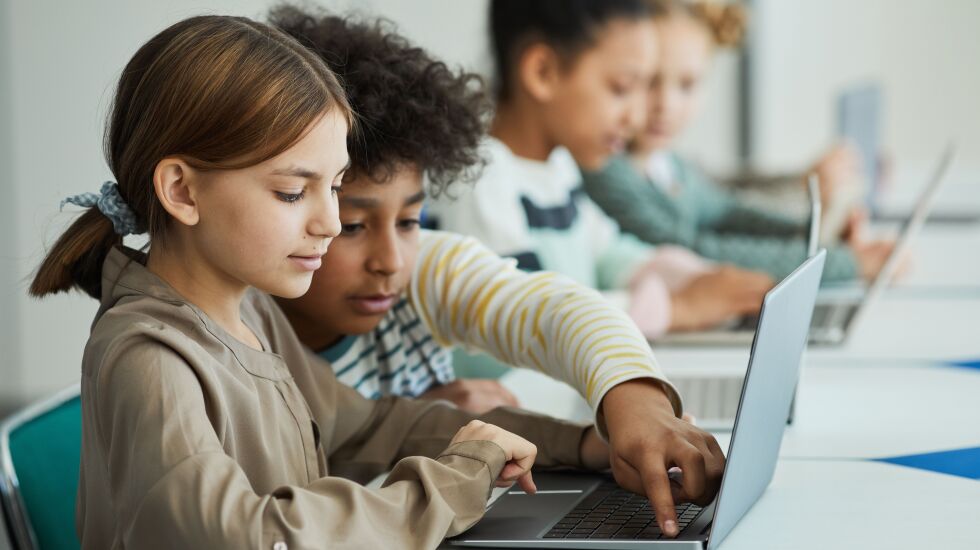
The socio-economic disruption caused by COVID-19 has had a devastating effect on many Chicagoans’ health and well-being. For some, the pandemic exacerbated challenges they were already facing, including a lack of access to stable income, housing, food, and child care.
However, one pandemic-era program demonstrated that Chicago can solve big inequities when a spirit of partnership and the right resources are in place.
In spring 2020, following Chicago Public Schools’ shift to remote learning, parents in Kids First Chicago’s (K1C) network raised the alarm that many students would be unable to participate because they lacked broadband internet and computers at home. In an April 2020 report, K1C and Metropolitan Planning Council revealed that roughly one in five school-age children in Chicago — the majority of whom lived on the South and West sides — faced this challenge.
The report spurred a partnership between the City of Chicago, CPS, over 30 community-based organizations, philanthropy and internet service providers to launch Chicago Connected, the country’s most comprehensive internet connectivity program for school-age students.
Since launching in June 2020, Chicago Connected has served nearly one in three CPS students , more than 100,000 students in 60,000 households.
In a new report, K1C found the connectivity gap for school-age children was halved during the first six months of Chicago Connected — from approximately 110,000 disconnected children in 2018 to roughly 55,000 by the end of 2020. Moreover, adults in the program logged nearly 30,000 learning hours using free digital learning resources, and many families received free refurbished computers.
Even with these gains, however, over 200,000 Chicago households still do not have high-speed internet. Additionally, over 260,000 households in Chicago, nearly one in four, do not own a laptop or desktop computer.
And the digital divide is about more than access to devices and the internet. It is also about the ability to navigate an increasingly digital world. A lack of digital skills prevents many Chicagoans from finding new jobs, accessing telehealth resources, and participating fully in modern society. A world of opportunity is closed to them and impedes their upward economic mobility.
The model of partnership established by Chicago Connected provides a path for the city to eradicate the digital divide and unleash the potential of all residents to thrive.
First, internet connectivity gaps can be tackled through community-led efforts to sign up families in the federal government’s Affordable Connectivity Program (ACP), as well as by expanding internet offerings available in the city. ACP, which provides a $30 monthly subsidy for internet service, has only been utilized by one-third of eligible households in Chicago. Community organizations can boost participation by helping households navigate the sign-up process. Their outreach should be funded by both government and internet service providers.
Additionally, funding from the federal government’s $1 trillion infrastructure bill can expand internet service options and foster greater competition — giving consumers the benefits of more choice, improved service and lower prices.
Second, the lack of devices can be addressed through a public-private partnership to recycle and distribute computers to households in need. The lifespan of a computer is around three years, after which the device is usually sent to a landfill or shelved. A “Chicago Challenge” — a competition between the city’s public and private sectors to donate devices to local computer refurbishment companies and have community partners distribute them to households in need — would create a device recycling pipeline so every Chicago home has a computer within three years.
Finally, the lack of digital skills can be overcome with better marketing of learning resources and stronger alignment between content providers, employers and higher education. Chicago has plenty of low-to-no-cost, high-quality digital learning offerings, but the content is fragmented across government agencies and providers. Chicago needs a single, designated entity — we recommend the Chicago Public Library — to be a one-stop-shop for digital skills resources.
Plus, content providers and employers should establish a certificate-to-employment pipeline that offers Chicagoans professional-level certification with access to jobs in high-growth industries. To better support adult learners considering a return to school, content providers and higher education institutions should help make college more attainable by ensuring all online learning opportunities are credit-bearing.
The strides made by Chicago Connected demonstrate that our city has the resources, talent, and expertise to achieve digital equity for everyone. All we need now is the will and commitment to succeed.
Hal Woods is chief of policy and José Daniel Pacas, Ph.D., is chief of data science and research for the nonprofit Kids First Chicago.
The Sun-Times welcomes letters to the editor and op-eds. See our guidelines.
The views and opinions expressed by contributors are their own and do not necessarily reflect those of the Chicago Sun-Times or any of its affiliates.







